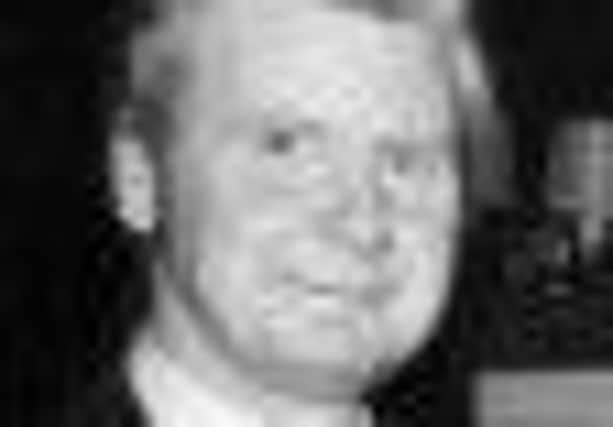Obituary: Colin Liddell, film–maker, author and local historian


COLIN Liddell is perhaps best known for a video compilation he made just seven years ago entitled Memories of the David MacBrayne Fleet, about the celebrated ships which served Scotland and her islands.
He also made a film about the glory Doon the Watter days of the Clyde steamers, from the Jeannie Deans to the paddle steamer Waverley, which sailed out of Craigendoran, by Helensburgh, to Rothesay and the Kyles of Bute.
Advertisement
Hide AdAdvertisement
Hide AdIn addition, Liddell compiled a book of old photographs and historical information about the Vale of Leven towns of Alexandria, Bonhill, Jamestown, Balloch and Renton in Dunbartonshire in the 1940s and 1950s.
He took many of the photographs himself and shot an ongoing series of videos of the Vale during years of extensive redevelopment there, which saw the end of the silk dyeing industry along the banks of the River Leven and the closure of the munitions industry at the Royal Naval Torpedo Factory in Alexandria.
Liddell’s Memories of the David MacBrayne Fleet tells the story of Caledonian MacBrayne’s predecessor and how the name was synonymous with the Highlands and Islands.
The 47-minute documentary, issued by Video History Scotland, is a foray into the past that was much sought after and greatly enjoyed by transport enthusiasts.
Written and produced by Liddell – who has a long list of other films to his credit, including many relating to Dumbarton and Helensburgh – the documentary features previously unseen footage of the famous MacBrayne ferry fleet during its final decade of operation
Many of Scotland’s favourite steamers appear in the film, including Lochfyne, King George V, Lochinvar, Lochnevis, Lochmor, Lochbuie, Loch Seaforth and Claymore– all of them evoking happy memories of days gone by.
Liddell was the son of an admiralty police officer and so the family moved around the country. His father was posted to such diverse places as Glasgow, Greenock, Balloch, Cardross and Inverness.
Liddell was a lifelong member of the Church of Scotland and met his wife, Wilma, at a dance in Jamestown Parish Church hall when she was 15 he was just 18.
Advertisement
Hide AdAdvertisement
Hide AdThey were married by the Rev Allan Hassan in Bonhill South Parish Church and held their wedding reception in the Alexandria Masonic Hall.
The Rev Ian Miller, who conducted Liddell’s funeral service at the now merged Bonhill Parish Church, said: “They stayed married for 62 years. This was a love match from day one and as I spoke to Wilma after Colin’s passing, I know it was a love match that stood the test of time.
“And if it’s at all possible, they got more in love as the years passed.”
Liddell’s working life was initially varied and included a spell as a quality inspector at the Westclox clock factory on Strathleven Industrial Estate.
He had previously studied food technology at the Royal Technical College in Glasgow, which was later to become Strathclyde University.
Liddell was always interested in television and films and he knew how televisions worked, having been employed for a time as a repair technician.
His real passion, though, was for local history and producing films. He even constructed a film studio inside his home in King Edward Street, Alexandria.
He then took up a lecturing appointment in the audio visual department of Jordanhill Education College in Glasgow.
Advertisement
Hide AdAdvertisement
Hide AdThis was the perfect job for him that set him thinking that perhaps he could produce his own titles and led to him doing exactly that.
It led to him producing a marvellous historical legacy in words, photographs and video of the social history of the West of Scotland.
Among the events he recorded were Vale of Leven Juniors winning the Scottish Cup in 1953 and the great street parties of that year when towns went en fete for the Coronation of Queen Elizabeth II.
Rev Miller said: “There were wonderful pictures of the crowds gathering at the Fountain in Alexandria to welcome the Vale team home from Hampden Park, priceless memories captured on film for the community here.
“His books about the history of Vale of Leven – a total of three volumes – are valuable contributions to the area.”
Liddell occasionally strayed away from home turf to capture on film events such Lanimer Day in Lanark, the passing pageant of shipping on the River Clyde, the puffers that were built at Bowling and the Fair Holiday crowds enjoying themselves Doon the Watter in Millport, Dunoon and Rothesay.
Transport was his great love and he made films of the railways, the ferries, the Clyde and Highlands and Islands steamers. These became very popular here at home and with exiled Scots abroad.
When, following the death of their daughter, Elaine, the Liddells moved north to live in Inverness with their daughter Pamela, son-in-law Gary and the grandchildren Lomond and Ruby, they greatly enjoyed life there. The Liddells soon became part of the community.
Advertisement
Hide AdAdvertisement
Hide AdIn terms of legacy, Liddell influenced many young lives as a Sunday School superintendent in Upper Bridge Street Church and also Alexandria North.
“He was a man of complete and convinced faith and that remained with him till the end,” said the minister before his funeral at the Vale of Leven Cemetery.
Liddell remained brave and courageous throughout his illness, the final days of which were spent at the Highland Hospice in Inverness, where the care of the doctors and consultants was beyond the call of duty. Through it all, Liddell’s faith shone like a beacon.
He is survived by his wife Wilma, son Colin and daughter Pamela, four grandchildren and three great-grandchildren and was predeceased by his daughter, Elaine.